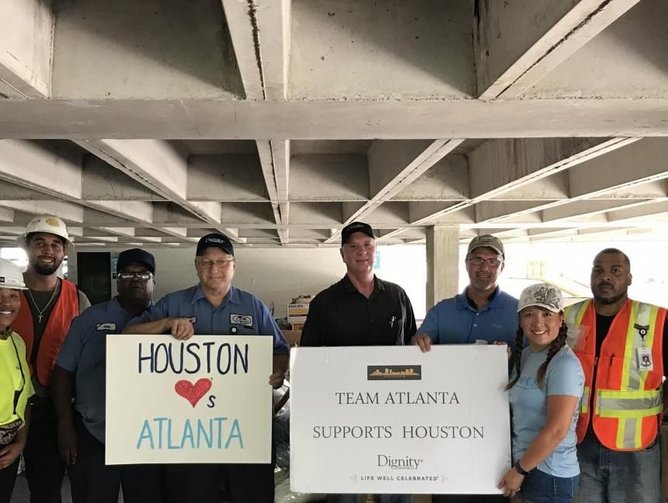An in-depth look at Service Corporation International’s trailblazing supply chain transformation
Planning a funeral is an emotionally testing task, but it is one, which many people will have to face in their lifetime. Navigating a variety of choices from caskets and flowers to music selection whilst also dealing with grief is a delicate balancing act, but luckily, there is an array of deathcare professionals ready to guide you through the process – not least affiliates of Texas-headquartered firm Service Corporation International (SCI)*, which has quickly established itself as the leading deathcare provider in North America. With a network of more than 2,000 funeral homes and cemeteries, SCI provides world-class funeral, cremation, and cemetery services to thousands of families each year. In doing so, Christopher Jones, Director of Indirect Procurement, says that SCI helps families through difficult times, helping to celebrate their loved ones’ lives with compassion and dignity.
“In my opinion, SCI helps families in their greatest time of need, and our focus and mission centers around this need,” observes Jones. “Our 24,000 associates work every day to ensure that our families are taken care of, that they don't have to worry about the little details when they're grieving over a loved one that they've lost.”
With funeral homes and cemeteries in 45 states, eight Canadian provinces, the District of Columbia and Puerto Rico, SCI has an unparalleled network and a diversified range of end-of-life offerings. The supply chain is, therefore, a pivotal part of the operations and so the company has embarked on a transformation to ensure it can continue to deliver and help hundreds of thousands of families each year.
“I believe that supply chain is a key group in our operations,” Jones adds. “We make sure that our locations don’t have to worry about the little things, ensuring that we have the necessary operational supplies and merchandise on behalf of our families so that they can have the best possible service for their loved ones. The activities that we do every day are critical for our operations.
“Since we are the largest company in the deathcare industry, our ability to go to our suppliers with large volume purchases means we can achieve optimal pricing for our locations.” Supplier relationship management is a critical function for a supply chain professional, and it is a task Jones is keen to highlight too. With different groups within the procurement organization – direct procurement and indirect procurement as well as a business support services group – Jones outlines how each department takes a unique approach to sustain and foster strong relationships with suppliers.
“My group is indirect procurement, which procures operational supplies and services,” he explains. “Then we have a direct group which focuses on the merchandise side. The best way to describe the difference between these groups is that my group impacts the bottom line of our organizations, while the direct group affects the top line – that is, sales and revenue. Then we have one more procurement group, which controls our fleet of vehicles, which is one of the largest in North America, and they also handle travel, P-Card (purchasing card) services, and other offerings.
“We have some companies that we’ve worked with for decades and others that we’re just now developing new relationships. We are working to make sure that we continue to create a win-win partnership that benefits both sides – that's always our goal.”
Striking a balance between driving cost efficiency and deriving value is one of the most pressing challenges facing the supply chain sector today. At SCI, the company works shoulder to shoulder with other departments to truly understand what their pain points are, what type of services and goods they are looking for and what values are most important to them. “In most instances, the supply chain department won't be the primary user of products or services we buy; it will generally be another group within SCI. Therefore, we partner with these business process owners to identify what their short- and long-term needs are and what's going to satisfy those needs. We put together business requirements to ensure that the people to whom we choose to send a request for proposal (RFP) meet the overall needs of the business.
“Being in the procurement profession long enough, you realize that the best price doesn’t always equate to the best service. Good procurement organizations tend to ensure that all the services can be met, that all the needs of the organization are considered and that we drive the best total value to the organization overall.”
SCI has also turned its attention to the digital world to drive value. As part of the company’s supply chain transformation, SCI zeroed in on new trailblazing technologies such as Coupa’s procurement platform which has helped to make procurement more visible and accessible. “Coupa is a unique procurement platform. Overall, it’s a very user-friendly environment for our locations to order products we procure on their behalf. We put these products into Coupa into what are called catalogs, which allows our team to almost shop like they’re on Amazon. They can put items into a cart, check out and it automatically creates a purchase order (PO) which is systematically sent to our vendors.”
As part of its business, SCI also offers travel services to help clients travel home to pay their respects – another area of the business to have been upended by technology. “Working very closely with Carlson Wagonlit, the company has created the CWT platform that all our 24,000 employees through North America and Puerto Rico use to book their airline travel hotels needs and car rentals, for example.” On top of this, the Texas-headquartered firm also has a fleet of 7,000 vehicles which it oversees using a digital fleet management platform.
Data is the lifeblood of any procurement team and, at SCI, Jones points out that data analytics has allowed the company to evaluate and benchmark its purchases. “I think data is key in everything that we do,” he explains. “It drives our decision making and allows us to analyze our purchases to ensure we’re driving the right total value for our organization. One key example of how we use data is that it allows us to analyze different trends and forecast whether the price of bronze, metals or other materials is going to rise or fall.”
With a compassionate, empathetic team, SCI’s employees have not been neglected by the transformation. Creating a culture that fosters innovation and collaboration, the company teamed up with KPMG to develop a new Supply Chain Academy to train its team. “They’ve been a key part of our success,” notes Jones. “Working with KPMG, we implemented the Supply Chain Academy, a training system for our new buyers and managers in the supply chain organization to ensure that they continue their education and understanding. They are kept up-to-date with not just the deathcare industry but also supply chain trends, what's going on and how they can best manage their categories to ensure that they're driving the best total value for our organization.”
SCI’s supply chain transformation may be still underway, but the firm has already made impressive progress. At the beginning of this roadmap, SCI ranked 2 out of 5 on KPMG’s Procurement Maturity Index, whereas now this figure has soared to 4. “The goal has been the same from the beginning: to be a world-class supply chain organization,” reflects Jones. “With our roadmap, we will be among the top echelon of supply chain organizations as far as your maturity, systems and processes.”
*As used herein, “Service Corporation International” or “SCI” refers to Service Corporation International and all of its affiliated companies.









